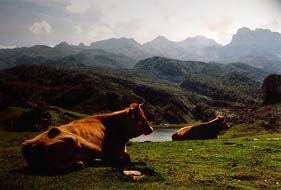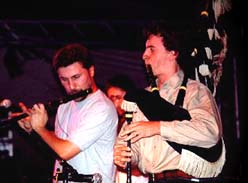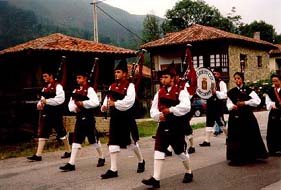FolkWorld article by Michael Moll:
Separated by mountains, linked by the sea
Llan de Cubel and the Asturian Celtic connection
 Separated by a range of mountains to the rest of Spain, the county Asturias (and also Galicia) in Northern Spain is different in several ways to the Southern parts of Spain: The county looks green, and the music sounds somehow familiar to ears used to listen to Irish or other Celtic music.
Separated by a range of mountains to the rest of Spain, the county Asturias (and also Galicia) in Northern Spain is different in several ways to the Southern parts of Spain: The county looks green, and the music sounds somehow familiar to ears used to listen to Irish or other Celtic music.
Asturias and Galicia, both belonging to the Green Spain or Atlantic Spain, are the two countries in Spain with strongest Celtic roots. Fonsu, percussionist of Asturian folk band Llan de Cubel, says about the Celtic connections of Asturias that "obviously historically and culturally there are links with the other countries of the Atlantic Sea. There were always exchanges with Brittany for example, many fishermen and traders as well; there were exchanges with the British Islands, with Brittany and the Atlantic coast of Europe." Another reason is geographical; "Asturias has a natural border with the rest of Spain. Asturias is a very green country with lots of mountains, and the natural border is a range of mountains that seperates Asturias totally from the rest, it's a kind of wall, and Asturias was isolated with these mountains. So the natural escape, the natural exit was the sea. You couldn't cross the mountains because they are very high, and there weren't good roads or whatever. There was a natural relationship."
Today, the Asturian-Celtic connection is strong again, Llan de Cubel have close relationships to the people of Scotland and Ireland. They do exchanges: Scottish and Irish bands come to play in Asturias, and Llan de Cubel go to play there. Some Scottish and Irish bands play also Asturian tunes, and Asturians play Irish and Scottish tunes in sessions.
 Despite this strong relationship, Fonsu emphasizes that the music of each place is different. "There are similarities, and some people, when they see the Asturian pipes they think it's similar to Scottish pipes, and obviously the instrument is similar. The music sometimes is similar because it's music for the pipes; it's music for that type of instrument and all the ornaments on this type of music are similar."
Despite this strong relationship, Fonsu emphasizes that the music of each place is different. "There are similarities, and some people, when they see the Asturian pipes they think it's similar to Scottish pipes, and obviously the instrument is similar. The music sometimes is similar because it's music for the pipes; it's music for that type of instrument and all the ornaments on this type of music are similar."
Llan de Cubel's music is also very much its own. Describes Fonsu, "the music we are playing in Llan de Cubel is traditional Asturian music, mainly based in the repertoire for the Asturian pipes. We take most of our repertoire from pipe tunes for the Asturian pipes, the gaita." Together with the gaita, Llan de Cubel have percussion/keyboards, fiddle, flute, bouzouki, guitars and (Spanish) vocals creating a fine sound of Asturian traditions. They have pleased their audiences already at the biggest Celtic festivals in Europe, like Tønder and Celtic Connections.
And in Asturias itself? Is there a good folk music scene? "Yes, it is. The support of the public is getting better all the time; there are lots of young people playing for example pipes. There are thousands of very young pipers in Asturias; the average age for a piper there is maybe 17 or 16 years old. Many musicians play in pipe bands or folk groups." While the people's support is growing, there is still not much support from the local authorities. "Sometimes the folk music has been identified with nationalism, a thing which is absolutely ridicilous. And sometimes the party governing in the Autonom Government of Asturias, they don't like very much the development of the autonomy, like in Catalonia or the Basque country where they have a wider autonomy. So that is political things - stupid things. Nothing that we should consider very much."
 Another problem Fonsu has with the Spanish government is Flamenco music. "The central government of Spain and the mass media as well, they are promoting very much Flamenco music which is the music of the gispys of Spain. They give an image of Spain as if Flamenco was the only traditional music over there." So people in Spain as well as in the rest of the world are not aware that there are lots of different languages and cultures and different types of music in Spain; like in Catalonia or the Mediterranian coast, Castillas, Asturias, Galicia, in the Basque country. "The government does not give this image, they give just the image of Flamenco music. And now they are making a lot of pressure." Fonsu states that in Asturias most people do not like this music, apart from everything that comes from the South. He has the same problem with bull fighting; it is not traditional in the North; it is traditional in the South where they have Arabic influences. "It's the problem of many places in Europe that the governments want to uniformize everything."
Another problem Fonsu has with the Spanish government is Flamenco music. "The central government of Spain and the mass media as well, they are promoting very much Flamenco music which is the music of the gispys of Spain. They give an image of Spain as if Flamenco was the only traditional music over there." So people in Spain as well as in the rest of the world are not aware that there are lots of different languages and cultures and different types of music in Spain; like in Catalonia or the Mediterranian coast, Castillas, Asturias, Galicia, in the Basque country. "The government does not give this image, they give just the image of Flamenco music. And now they are making a lot of pressure." Fonsu states that in Asturias most people do not like this music, apart from everything that comes from the South. He has the same problem with bull fighting; it is not traditional in the North; it is traditional in the South where they have Arabic influences. "It's the problem of many places in Europe that the governments want to uniformize everything."
It does not seem right now that Asturian music is on the decline - people all over Europe seem to be interested in the culture of Green Spain. And in Asturias, there are many other bands to recommend. Fonsu likes to name the bands Felpeyu and Balandran, as well as the pipers Xuacu Amieva and Hevia. And many more.
If you come to Asturias, go to the cider bars, the sidrerias. Says Fonsu, "cider is the national drink of Asturias, for me it is the best Cider in the world. And if you go to the Cider bars, maybe you can find there a singer or a piper or..." Or find out about the very unusual way of drinking Asturian cider (especially how the sidra gets into the glass) - but that's another story.
Photo credits and comments:
- At the top: Picos d'Europe; mountains in Asturias. Photo by The Mollis
- In the middle: Llan de Cubel, live in Tø,nder. Photo by The Mollis
- At the bottom: Asturian pipe band. Photo by The Mollis
Latest published CD: "IV" on the Scottish Iona Label.
For booking and further infos, look at LLAN DE CUBEL's homepage
Back to the content of FolkWorld Articles
To the content of FolkWorld online magazine Nr. 2
© The Mollis - Editors of FolkWorld; Published 12/97
All material published in FolkWorld is © The Author via FolkWorld. Storage for private use is allowed and welcome. Reviews and extracts of up to 200 words may be freely quoted and reproduced, if source and author are acknowledged. For any other reproduction please ask the Editors for permission.
FolkWorld - Home of European Music

Layout & Idea of FolkWorld © The Mollis - Editors of FolkWorld
 Separated by a range of mountains to the rest of Spain, the county Asturias (and also Galicia) in Northern Spain is different in several ways to the Southern parts of Spain: The county looks green, and the music sounds somehow familiar to ears used to listen to Irish or other Celtic music.
Separated by a range of mountains to the rest of Spain, the county Asturias (and also Galicia) in Northern Spain is different in several ways to the Southern parts of Spain: The county looks green, and the music sounds somehow familiar to ears used to listen to Irish or other Celtic music. Despite this strong relationship, Fonsu emphasizes that the music of each place is different. "There are similarities, and some people, when they see the Asturian pipes they think it's similar to Scottish pipes, and obviously the instrument is similar. The music sometimes is similar because it's music for the pipes; it's music for that type of instrument and all the ornaments on this type of music are similar."
Despite this strong relationship, Fonsu emphasizes that the music of each place is different. "There are similarities, and some people, when they see the Asturian pipes they think it's similar to Scottish pipes, and obviously the instrument is similar. The music sometimes is similar because it's music for the pipes; it's music for that type of instrument and all the ornaments on this type of music are similar."  Another problem Fonsu has with the Spanish government is Flamenco music. "The central government of Spain and the mass media as well, they are promoting very much Flamenco music which is the music of the gispys of Spain. They give an image of Spain as if Flamenco was the only traditional music over there." So people in Spain as well as in the rest of the world are not aware that there are lots of different languages and cultures and different types of music in Spain; like in Catalonia or the Mediterranian coast, Castillas, Asturias, Galicia, in the Basque country. "The government does not give this image, they give just the image of Flamenco music. And now they are making a lot of pressure." Fonsu states that in Asturias most people do not like this music, apart from everything that comes from the South. He has the same problem with bull fighting; it is not traditional in the North; it is traditional in the South where they have Arabic influences. "It's the problem of many places in Europe that the governments want to uniformize everything."
Another problem Fonsu has with the Spanish government is Flamenco music. "The central government of Spain and the mass media as well, they are promoting very much Flamenco music which is the music of the gispys of Spain. They give an image of Spain as if Flamenco was the only traditional music over there." So people in Spain as well as in the rest of the world are not aware that there are lots of different languages and cultures and different types of music in Spain; like in Catalonia or the Mediterranian coast, Castillas, Asturias, Galicia, in the Basque country. "The government does not give this image, they give just the image of Flamenco music. And now they are making a lot of pressure." Fonsu states that in Asturias most people do not like this music, apart from everything that comes from the South. He has the same problem with bull fighting; it is not traditional in the North; it is traditional in the South where they have Arabic influences. "It's the problem of many places in Europe that the governments want to uniformize everything." 